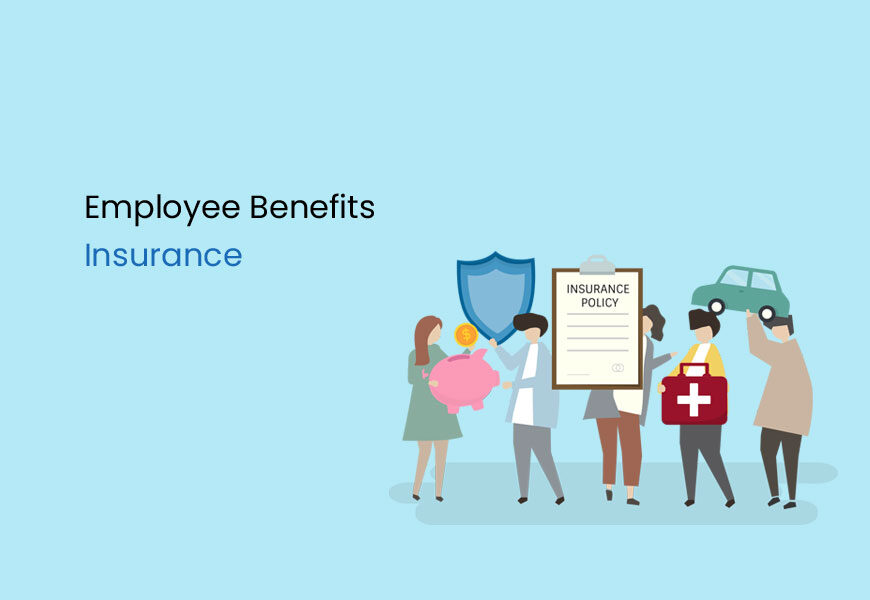One of the critical areas that have come into focus during the course of the global pandemic is the need for insurance, especially medical and life insurance, for everyone. In particular, the value that employee benefits insurance offers to employees has been widely discussed. Employee benefits insurance or EBI combines health insurance, life insurance, retirement benefits, worker compensation benefits and much more. It is emerging to be one of the key strategic tools for employers to attract and retain the right talent.
Employee Benefits Insurance: Meaning and Importance
Employee benefits insurance refers to an insurance policy/ plan offered by employers to provide health and life coverage, among others to their employees, enabling employees to face medical emergencies and other socio-economic eventualities. It may also include components such as worker’s compensation, disablement benefits, gratuity, retirement benefits, etc.
Many employers in India are seeing the value of these plans and are offering them as part of the employee benefits package. These policies are offered by many insurance companies in India, customised to the specific needs of the employees and employers. They include a range of benefits designed to meet the unique risks, contexts and needs of different types of employees such as entry-level workers, senior executives, blue-collar workers, etc.
In India, many insurance companies offer employee benefits insurance policies that can be customised to meet the specific needs of the employer and its employees. These policies typically include a range of benefits that can be tailored to meet the needs of different types of employees, from entry-level workers to senior executives.
Employee benefits insurance empowers employees and their families to tide over crisis situations and unforeseen circumstances such as illness, work injury, death, involuntary unemployment caused by natural disasters or disablement, etc. without falling into a financial crisis or poverty. By extending financial security to them and their families. It enables employees to manage their risks effectively and lead a peaceful life.
How Do They Work?
Employee benefits insurance plans are similar to individual insurance policies. The key difference is that the master policyholder in the case of employee benefits insurance plans is the employer who will also pay the premium for this group insurance policy.
The employees get coverage certificates, and they can access all benefits extended by these group policies. Certain benefits are also extended to the dependents of the employee such as their spouse, dependent children, infirm children, dependent parents and so on.
Types Of Employee Benefits Insurance Policy
Group Health Insurance
Group health insurance policies are master health policies purchased by employers to extend comprehensive healthcare benefits to all their employees. Typically, all employees, regardless of their experience, age, gender and role within the organisation, and their families are covered by these policies. The comprehensive healthcare benefits usually include outpatient consultations, inpatient care, hospitalisation, daycare treatment, maternity coverage, medication, testing, imaging, ambulance coverage, critical health cover, etc.
Group Life Insurance
Group life insurance policies are the type of employee benefit insurance policies that are purchased by employers to extend life insurance coverage to all their employees. Typically, employees can access the benefits of this policy without pre-medical checkups and other tedious processes. These policies offer financial security to the insured employee’s nominees/ dependents in the event of their untimely demise.
Group Personal Accident
Group personal accident policies extend financial protection to the employees and their families in the event of an accident, injury or death of the insured employee. Depending on the provisions of the policy, the employee/ their dependents gain access to health coverage, unemployment allowance, rehabilitation services access, vocational training, lumpsum payouts and so on.
What Should Be Included in It?
Healthcare
Medical insurance is perhaps the most important component of any employee benefits insurance. Out-of-pocket medical expenses, especially given the rising medical inflation, are skyrocketing. While high-income earners may be able to afford these out-of-pocket expenses, it is increasingly difficult down the organisational ladder.
A sudden hospitalisation or prolonged illness of the employee or a family member could be a major financial setback. In several cases, families are pushed (deeper) into a debt crisis and poverty. Health insurance ensures that employees and their families have access to preventive and curative healthcare services.
It is particularly important for employers to choose cashless schemes so that the employee doesn’t have to concern themselves with arranging for finances at such stressful times.
Maternity
Maternity benefits including paid leave for biological, adoptive and commissioning mothers, confinement and hospitalisation coverage, etc. must be included in the employee benefits insurance. This helps ensure that female employees have a peaceful and safe pre-natal and post-natal period.
Accident
Accident cover is necessary in employee benefits insurance as it provides financial security to the employee and their family in case of an accident that leads to disability or death of the employee. They will be able to cover medical expenses, rehabilitation, income loss and other expenses using this benefit.
Disability and Unemployment
Employees are often exposed to the risk of injuries and occupational diseases owing to the nature of their jobs. For instance, a platform gig worker working as a runner for an e-commerce platform has a high risk of back, neck and wrist pain owing to prolonged durations of riding bikes and carrying heavy loads. They may be skipping meals which could cause gastritis and other digestive issues.
In such cases, the employee benefits insurance should cover the risk of injuries and occupational diseases. It should provide them access to healthcare, medication, etc. to employees while extending unemployment allowances and disability benefits if there is a need.
Life insurance
Life insurance provides a sense of financial security to the employee’s family in the case of their untimely death. The family will have access to a lump sum payout and based on the provisions of the scheme, pensions, funeral expenses, etc. will be covered.
Retirement Plan
The employee benefits insurance plan should also include an element of retirement saving and planning, enabling employees to build a solid emergency and retirement corpus. This will help them have a financially independent and peaceful life after retirement.
Benefits Of Employee Benefits Insurance Policy
Low Or No-Cost Insurance Plans
Since the employer provides this insurance policy as part of the benefits package, employees have zero to no costs involved. Unlike personal insurance policies, employees don’t have to shell out sizeable portions of their income to get coverage. Even when employees are required to contribute to the scheme like government insurance plans (EPF, ESI, etc.), it is usually a small percentage of their monthly pay.
Covers Legal Liabilities
Employee benefits insurance policies enable employers to cover all kinds of legal liabilities that may arise out of unforeseen circumstances such as work accidents, injuries, occupational hazards/ diseases, etc.
Components such as auto insurance, personal liability insurance, etc. also enable employees to cover costs of damage that may have been caused to third parties owing to services rendered. Without this, employees will have to pay out of pocket and that can be devastating.
Provides Capital Growth and Annuity
Components such as retirement savings and life insurance do not just promote savings but also ensure capital appreciation over the long term. So, employees will have a solid emergency and retirement corpus that can help them meet any socio-economic eventualities effectively.
Click Here For – What Is payroll
Fulfil Long-Term Financial Goals
Every employee has some long-term financial goals such as retirement planning, children’s education and marriage, buying/ building/ repairing the house, etc. Employee benefits insurance enables employees to save and achieve such long-term goals.
Accident Coverage
Accident coverage enables employees and their families to meet unforeseen circumstances such as accidental injuries, permanent/ temporary disability or death of the employee in service. It offers financial cushioning to employees and their dependents in case of such crises.
Tax Benefits
Employee benefits insurance offers tax benefits to employees and employers.
Receive Cashless Benefits
Employees gain access to cashless treatment and a whole host of healthcare services at networked hospitals. This way, they do not have to pay out of pocket and the claims will be settled directly between the insurance company and the hospital. Employees do not have to go through the arduous process of claims settlements.
What Does It Cost Employers?
The cost of employee benefits insurance can vary depending on several factors including the type of coverage offered, the size of the company, the location of the business, and the demographics of the workforce.
Some of the most affordable insurance schemes are offered by the government in the form of Employees’ State Insurance (ESI) and Employees’ Provident Funds (EPF) schemes. They involve marginal contributions from employers and employees but offer tremendous benefits.
Employee Benefits Insurance Policy: The Eligibility Criteria
The eligibility criteria for employee benefits insurance policies will vary across different insurance providers and the specifics of the policy. However, some common eligibility criteria exist for employers and employees to access these policies.
For Employers:
- Most insurance companies require a minimum number of employees to be enrolled in the policy to qualify for group rates. For schemes like EPF, the company should have a minimum of 20 direct or indirect employees.
- The employer needs to maintain proper records and accounts of the salaried relationship between employers and employees.
- Mostly, public and private organisations, companies, MNCs, partnership firms, etc. can only access these policies. Sole proprietorship firms, small businesses, individual households, etc. may not be able to access even government insurance schemes. The TankhaPay app enables all kinds of employers to access employee benefits insurance that combines EPF and ESI schemes.
For Employees:
- Typically, only current employees of the employer will have access to the benefits offered by the employee benefits insurance policies. In some cases, retired employees and dependents of a deceased employee may be able to reap the benefits of such insurance through a token premium payment.
- These policies may require employees to have worked a certain duration within the organisation before they can access the benefits.
- Based on the type of policy and the insurance provider, there may be limitations on the kind of employees who can access these policies. For instance, private and even government insurance schemes don’t cover the majority of informal workers. It is only through the TankhaPay app that employers including individual households can extend employee benefits insurance to all formal and informal employees.
The Way Forward: How to Offer Employee Benefits Insurance to Informal Employees?
Employee benefits insurance policies are valuable employee retention tools for all kinds of employers. They enable organisations to extend a sense of financial security to their employees while showing them they care for the employees and their families. The simplest, most straightforward way to offer employee benefits insurance to all your employees including informal workers is through the TankhaPay app.
FAQs
Are employees allowed to customise their insurance policy as per their needs and requirements?
Yes, employees can increase or decrease the coverage offered by the policy as per their individual needs and contexts.
Download the app now.














